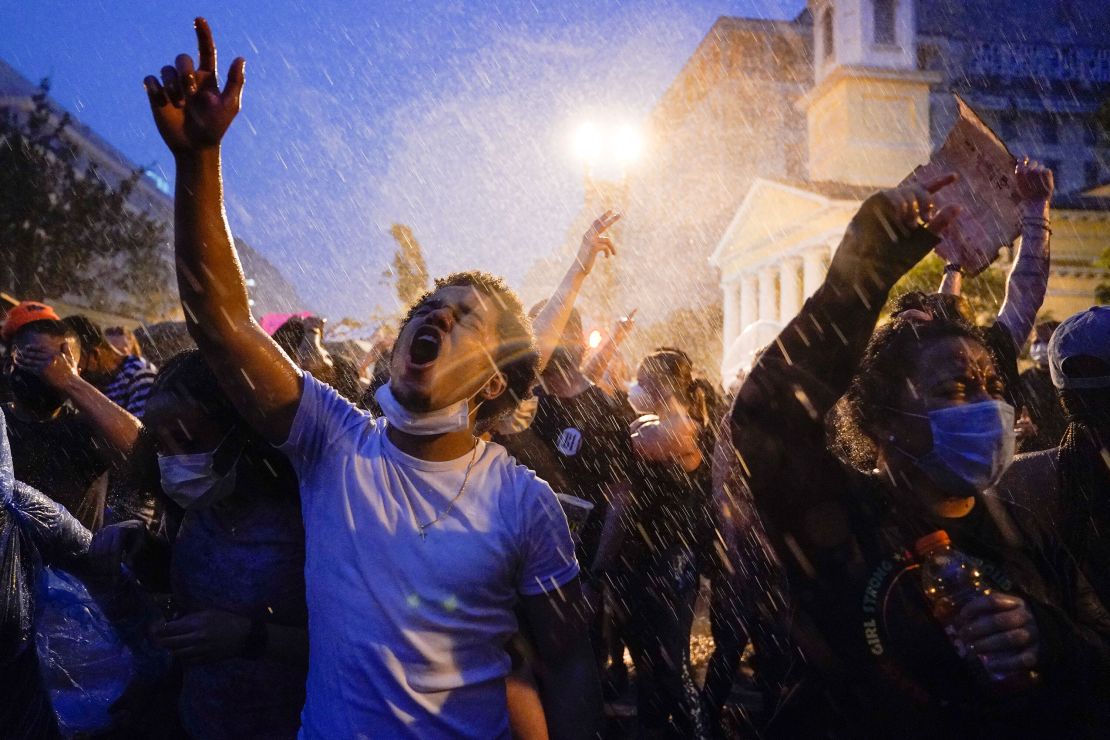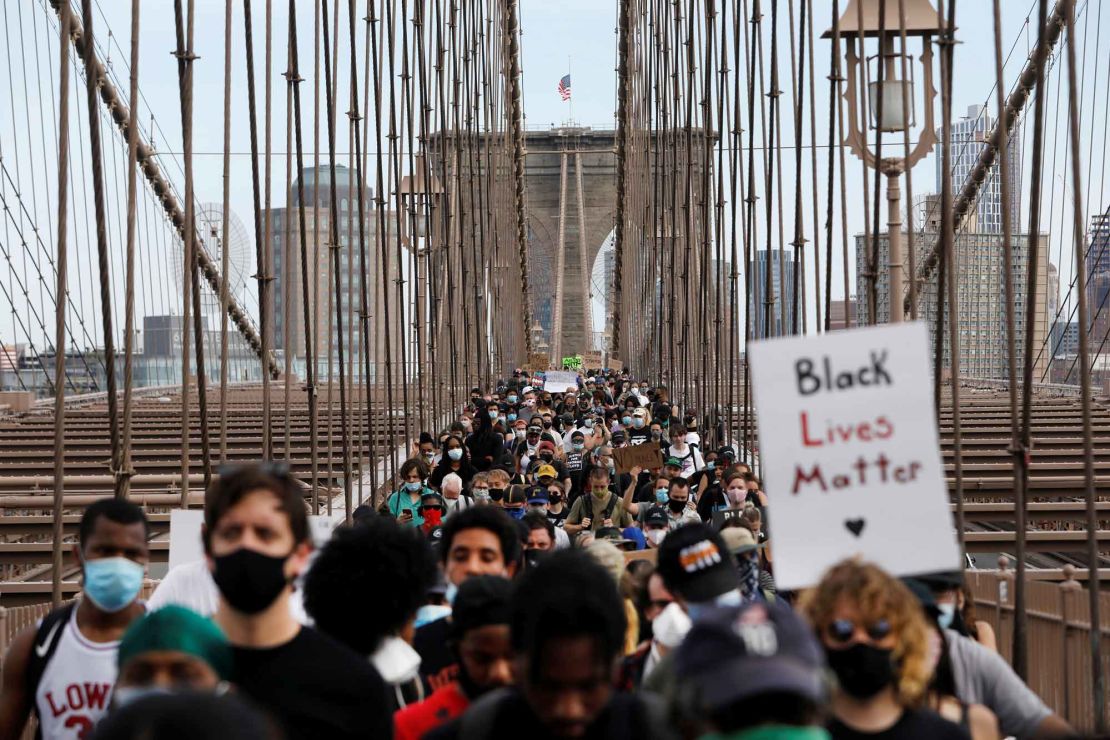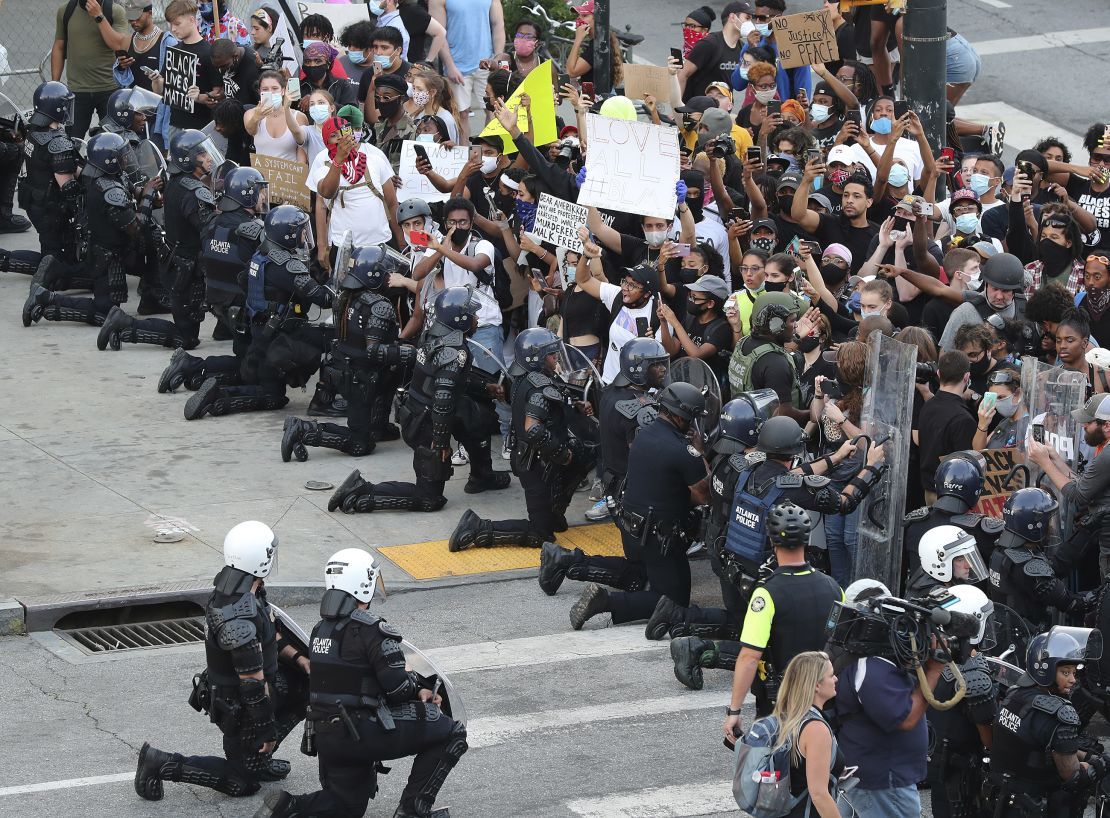A group of health and medical colleagues has penned an open letter to express their concern that protests around the United States could be shut down under the guise of coronavirus health concerns.
The letter – which went on to draw more than 1,200 signatures – focuses on techniques to reduce harm to people protesting racial injustice.
“We created the letter in response to emerging narratives that seemed to malign demonstrations as risky for the public health because of Covid-19,” according to the letter writers, many of whom are part of the University of Washington’s Division of Allergy and Infectious Diseases.
“Instead, we wanted to present a narrative that prioritizes opposition to racism as vital to the public health, including the epidemic response. We believe that the way forward is not to suppress protests in the name of public health but to respond to protesters demands in the name of public health, thereby addressing multiple public health crises.”

The letter focuses on health guidance for protestors and law enforcement, such as wearing masks, advocating to not hold people who are arrested in close proximity and opposing the use of tear gas for health reasons.
“Staying at home, social distancing, and public masking are effective at minimizing the spread of COVID-19. To the extent possible, we support the application of these public health best practices during demonstrations that call attention to the pervasive lethal force of white supremacy,” the letter says.
“However, as public health advocates, we do not condemn these gatherings as risky for COVID-19 transmission. We support them as vital to the national public health and to the threatened health specifically of Black people in the United States. We can show that support by facilitating safest protesting practices without detracting from demonstrators’ ability to gather and demand change. This should not be confused with a permissive stance on all gatherings, particularly protests against stay-home orders.”

The letter writers said they are concerned about health implications of protests, including how tear gas or smoke might cause people to cough, which can spread the coronavirus, and that people may be spending a lot of time together and not able to stay 6 feet apart.
“Prepare for an increased number of infections in the days following a protest,” the letter says. “Provide increased access to testing and care for people in the affected communities, especially when they or their family members put themselves at risk by attending protests.”

Dr. Abby Hussein, an infectious disease fellow at the University of Washington, noted that for black Americans this was truly a “life or death matter” and that protestors weren’t taking actions lightly.
“While everyone is concerned about the risk of Covid, there are risks with just being black in this country that almost outweigh that sometimes. And the sad part is the group that is protesting for their rights are the same people who are already disproportionately affected by the disease,” Hussein told CNN. “It’s something they’re doing because if they don’t fight for this now, they may never be able to fight for it in the future, because while Covid is right now, and we don’t know how long it’s going to last, white supremacy and oppression has been a long way longer, and we can guarantee that it’s going to continue if people don’t do anything about it now.”
The letter received more than 1,200 signatures of support before the authors closed the letter to signatures.
READ THE FULL LETTER:
Open letter advocating for an anti-racist public health response to demonstrations against systemic injustice occurring during the COVID-19 pandemic
On April 30, heavily armed and predominantly white protesters entered the State Capitol building in Lansing, Michigan, protesting stay-home orders and calls for widespread public masking to prevent the spread of COVID-19. Infectious disease physicians and public health officials publicly condemned these actions and privately mourned the widening rift between leaders in science and a subset of the communities that they serve. As of May 30, we are witnessing continuing demonstrations in response to ongoing, pervasive, and lethal institutional racism set off by the killings of George Floyd and Breonna Taylor, among many other Black lives taken by police. A public health response to these demonstrations is also warranted, but this message must be wholly different from the response to white protesters resisting stay-home orders. Infectious disease and public health narratives adjacent to demonstrations against racism must be consciously anti-racist, and infectious disease experts must be clear and consistent in prioritizing an anti-racist message.
White supremacy is a lethal public health issue that predates and contributes to COVID-19. Black people are twice as likely to be killed by police compared to white people, but the effects of racism are far more pervasive. Black people suffer from dramatic health disparities in life expectancy, maternal and infant mortality, chronic medical conditions, and outcomes from acute illnesses like myocardial infarction and sepsis. Biological determinants are insufficient to explain these disparities. They result from long-standing systems of oppression and bias which have subjected people of color to discrimination in the healthcare setting, decreased access to medical care and healthy food, unsafe working conditions, mass incarceration, exposure to pollution and noise, and the toxic effects of stress. Black people are also more likely to develop COVID-19. Black people with COVID-19 are diagnosed later in the disease course and have a higher rate of hospitalization, mechanical ventilation, and death. COVID-19 among Black patients is yet another lethal manifestation of white supremacy. In addressing demonstrations against white supremacy, our first statement must be one of unwavering support for those who would dismantle, uproot, or reform racist institutions.
Staying at home, social distancing, and public masking are effective at minimizing the spread of COVID-19. To the extent possible, we support the application of these public health best practices during demonstrations that call attention to the pervasive lethal force of white supremacy. However, as public health advocates, we do not condemn these gatherings as risky for COVID-19 transmission. We support them as vital to the national public health and to the threatened health specifically of Black people in the United States. We can show that support by facilitating safest protesting practices without detracting from demonstrators’ ability to gather and demand change. This should not be confused with a permissive stance on all gatherings, particularly protests against stay-home orders. Those actions not only oppose public health interventions, but are also rooted in white nationalism and run contrary to respect for Black lives. Protests against systemic racism, which fosters the disproportionate burden of COVID-19 on Black communities and also perpetuates police violence, must be supported.
Therefore, we propose the following guidance to support public health:
● Support local and state governments in upholding the right to protest and allow protesters to gather.
● Do not disband protests under the guise of maintaining public health for COVID-19 restrictions.
● Advocate that protesters not be arrested or held in confined spaces, including jails or police vans, which are some of the highest-risk areas for COVID-19 transmission.
● Oppose any use of tear gas, smoke, or other respiratory irritants, which could increase risk for COVID- 19 by making the respiratory tract more susceptible to infection, exacerbating existing inflammation, and inducing coughing.
● Demand that law enforcement officials also respect infection prevention recommendations by maintaining distance from protesters and wearing masks.
● Reject messaging that face coverings are motivated by concealment and instead celebrate face coverings as protective of the public’s health in the context of COVID-19.
● Prepare for an increased number of infections in the days following a protest. Provide increased access to testing and care for people in the affected communities, especially when they or their family members put themselves at risk by attending protests.
● Support the health of protesters by encouraging the following:
○ Use of face coverings.
○ Distance of at least 6 feet between protesters, where possible.
○ Demonstrating consistently alongside close contacts and moving together as a group, rather than extensively intermingling with multiple groups.
○ Staying at home when sick, and using other platforms to oppose racism for high-risk individuals, and those unable or uncomfortable to attend in person.
● Encourage allies who may wish to facilitate safe demonstrations through the following:
○ Providing masks, hand-washing stations, or hand sanitizer to demonstrators.
○ Providing eye protection, such as face shields or goggles, for protection against COVID-19 and chemical irritants used to disperse crowds.
○ Bringing wrapped, single-serving food or beverages to sustain people protesting.
○ Providing chalk markings or other designations to encourage appropriate distancing between protesters.
○ Supplying ropes, which can be knotted at 6-foot intervals, to allow people to march together while maintaining spacing.
○ Donating to bail funds for protesters
● Listen, and prioritize the needs of Black people as expressed by Black voices.
These are strategies for harm reduction. It is our sincere hope that all participants will be able to follow these suggestions for safer public demonstrations, assisted by allies where possible and necessary, but we recognize that this may not always be the case. Even so, we continue to support demonstrators who are tackling the paramount public health problem of pervasive racism. We express solidarity and gratitude toward
demonstrators who have already taken on enormous personal risk to advocate for their own health, the health of their communities, and the public health of the United States. We pledge our services as allies who share this goal.
This letter is signed by 1,288 public health professionals, infectious diseases professionals, and community stakeholders.

